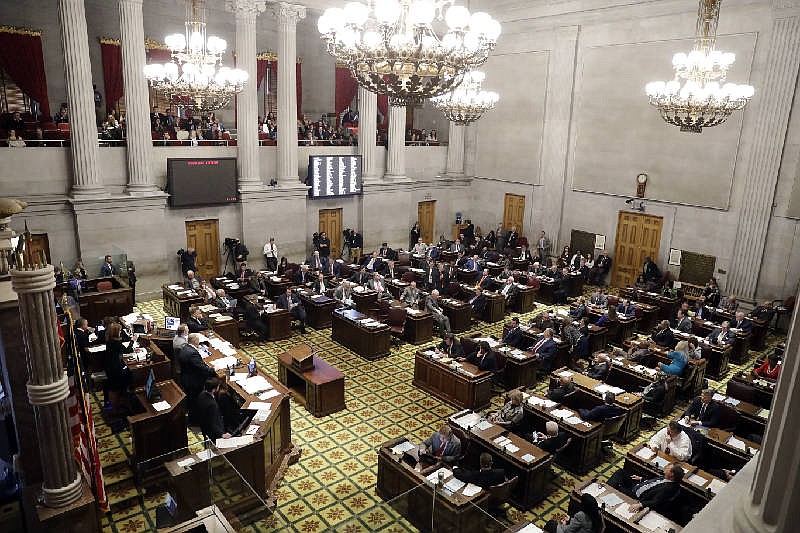NASHVILLE - In a successful bid to win over more rural GOP lawmakers' support for Republican Gov. Bill Lee's school voucher bill, House GOP leaders added Wednesday night a Robin Hood-like amendment that would aid smaller public school districts at the expense of the four largest systems, including Hamilton County.
The amendment on House Bill 939 then passed the Finance Committee on a 13-8 vote with Vice Chair Patsy Hazlewood, R-Signal Mountain, voting no. The bill then cleared the panel on a voice vote after minority Democrats evidently forgot to ask for a recorded vote on that.
House Republican leadership coordinated with Lee on the amendment to smooth passage of his education savings account bill, which seeks to use public tax dollars to provide an average of $7,300 in accounts for parents to pay for private school tuition for up to 30,000 students.
According to estimates from the Tennessee County Services Association, Hamilton County stands to lose between $2.74 million and $16.39 million annually under the state Basic Education Program formula. The lower figure is based on 5,000 students getting an education savings account as the program starts and the higher figure is based on 30,000 students participating statewide.
The hit for Hamilton County, which contributes about 48% local tax dollars to the Basic Education Program, while the state covers the rest, would be between $2.47 million and $14.87 million, again, looking at the lowest and highest figures for education savings account participation, according to the Tennessee County Services Association figures.
As amended, the bill cuts a good portion of the annual $25 million Lee originally proposed over a three-year period to allow urban systems to adjust.
Now, part of the money would go to rural districts with struggling schools that aren't included in the voucher-like program. The list of beneficiaries includes the Jackson/Madison County district, which originally was in Lee's education savings account bill but no longer is.
The original bill was restricted to districts with three or more schools falling into the state's lowest 10% ranking in terms of student performance, impacting Hamilton, Knox, Metro Nashville, Shelby, the much smaller Jackson/Madison County system and the state's Achievement School District for problem schools.
But changes helped Jackson/Madison to escape the education savings account program.
"I am excited that the rural community is now engaged in education savings accounts," House Speaker Glen Casada, R-Franklin, told reporters earlier on Wednesday. "They are engaged in reaching out to those areas of the state where students are doing poorly and giving them an avenue to succeed in school and thus succeed in life."
Deputy Speaker Matthew Hill, R-Jonesborough, who has opposed voucher programs in the past, spoke in favor of the amendment.
"Really, at the end of the day, this is really important to me and important to a number of rural legislators," Hill said.
Speaker Pro Tem Bill Dunn, R-Knoxville, a long-time voucher proponent, likened the education savings account proposal to higher education in which public dollars from federal Pell Grants as well as the Tennessee Lottery help provide aid to students whether they attend public or private schools.
Later, a dismayed Rep. Yusuf Hakeem, D-Chattanooga, who isn't a member of the Finance panel, said he wished everyone had been "given some more time to have broader input. Sometimes people feel like something's being put upon them instead of having a greater voice on an issue."
Hakeem, who noted he had spoken with Lee about the bill, said "when you're striving to get one of those issues done that sort of could define your governorship, you reach out in every way again. But again, I'd say the stakeholders in the four large cities in Tennessee, I would have liked to have seen more outreach."
Lee met with school board members on Tuesday from the Hamilton, Knox, Metro Nashville and Shelby school systems.
Hamilton County School Board members Tiffanie Robinson and Jenny Hill were among five local members who joined with Superintendent Bryan Johnson to meet with Lee at the state Capitol at the governor's invitation.
"He made a point the bill is constantly changing, certainly wanted to point out that likely there will be multiple changes before it was finalized but would not provide more specifics on that," said Robinson, who along with Hill is concerned about the local impacts.
The bill now will be scheduled for floor action. The Senate companion bill remains in Senate Finance, where Sen. Bo Watson, R-Hixson, is chairman.
It was not immediately clear whether the Senate will go along with the House action that cuts a portion of the soft-landing funds for the Big Four counties, including Watson's home county Hamilton.
Sen. Todd Gardenhire, R-Chattanooga, a longtime voucher proponent, told the Times Free Press over the weekend that he opposes Lee's bill for several reasons, including that it now excludes undocumented immigrant students. Gardenhire has fought unsuccessfully for years to allow the students to pay in-state tuition rates at public colleges.
Lee officials have said the governor wants to spend $125 million by Year 5 of the education savings account program with his original 15,000-student cap. But critics say that doesn't include the local funds for the Basic Education Program formula, some of which will be paying for the education savings account programs.
Unlike traditional school voucher programs, through which parents are given a voucher to pay for private school, Lee's education savings account bill follows similar programs like those in Arizona and other states. The money would go into special individualized bank accounts that families could draw on for tuition, school uniforms, tutoring and other education-related expenses.
The House version deletes Lee's original plan to include parents who homeschool their children. But the Senate version includes it.
Lee's education savings account bill is part of his effort to promote what he says are more school choice options in Tennessee education.
Contact Andy Sher at asher@timesfreepress.com or 615-255-0550. Follow him on Twitter @AndySher1.
